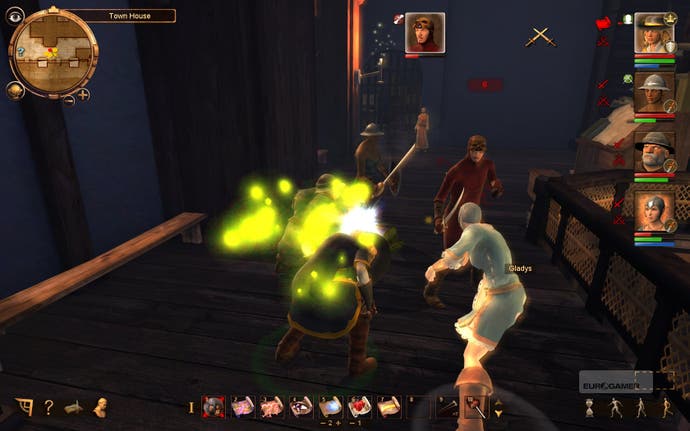Drakensang: The Dark Eye
I love a party with a happy atmosphere +4.
There's an annoyance I have to deal with when playing Drakensang. The annoyance is that whenever I get down to a deep, involving tactical session of balancing my team's abilities, wondering whether some on-the-fly-XP tweaking is required to beat back this oppressive wall of undead, my girlfriend sticks her head around the office door and asks me if I'm still playing Shrek.
This anecdote illustrates three crucial things you should know before continuing. One: Drakensang is a team-based RPG, but not the sort where you can group your team, select the enemy and send them off. It's one where you actually have to think about your builds, your layout and, well, not dying. At least some of the time.
Two: Yes, at a glance its brightly-lit graphic style of cartoon realism can resemble a certain Dreamworks picture. Especially in towns and around humans, the game's tone leans towards light and borderline twee. In other words, the opposite of The Witcher. Don't expect to see pudenda.
Three: I have a girlfriend.

That's Drakensang. It's a phenomenally traditional PC party-based RPG which embraces its genre with genuine love. It's got enough of a budget to be properly attractive - drawing comparisons to a film is hardly an insult. And your partner will probably mock you for playing it. Which, for any true RPG fan, is always part of the fun. This isn't about intercourse. This is about dice.
Drakensang isn't afraid of dice. It's a conversion of the German RPG system Das Swartze Auge (The Dark Eye) which, while it deals with a standard role-playing world, takes its own approach to the rules. And it appears to be a faithful conversion that doesn't even try to hide its nature. The loading screen talk a lot about dice, even though there will be people playing this who haven't seen dice since they played Monopoly when they were 12.

Drakensang's greatest strength is that it's a fundamentally different system from the Dungeons & Dragons-derived ones that have dominated RPGs. While there are levels, their importance is enormously downplayed in favour of a skill-point model. Each exact ability in the game - from your skills to your statistics - requires a certain number of experience points to raise. So gaining your first level of a new skill can be a piddly couple of points or so, while increasing your already-above-average strength could be 500. The game is full of tactical questions we really haven't wrestled with before - or, at least, not for ages - which makes Drakensang novel, even when dealing with a standard RPG situation.
Drakensang's greatest problem is explaining itself. While there's a tutorial when you first meet something, and there are pop-ups on individual game elements showing the maths, there's nothing like a big, accessible, in-game manual for looking up stuff. Even some of the pop-ups are a little confusing.

